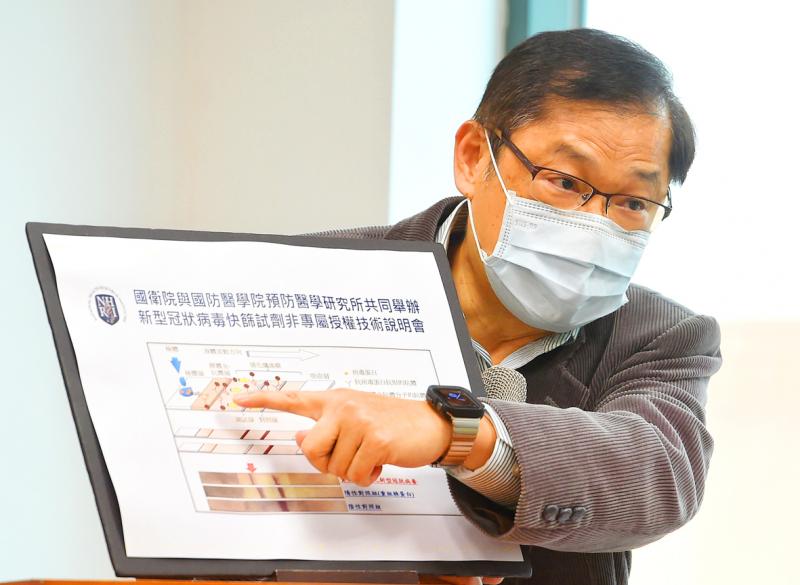The National Health Research Institute (NHRI) and the National Defense Medical Center yesterday announced a prototype COVID-19 rapid diagnostic kit that can provide results in about 15 minutes.
The NHRI and the center’s Institute of Preventive Medicine used SARS-CoV antibodies produced during the SARS outbreak in 2003 and picked out one that can identify SARS-CoV-2, which causes COVID-19, to develop the rapid test kit.
After spending a month developing the test kit, the institutes yesterday in Taipei presented the prototype to pharmaceutical companies in the hope of achieving technology transfers and starting mass production.

Photo: Liu Hsin-de, Taipei Times
The test works by placing a specimen taken from the mouth or nose onto a test strip, which siphons the specimen toward the antibodies on the strip, NHRI National Institute of Infectious Disease and Vaccinology Director Liao Ching-len (廖經綸) said.
As researchers have identified the coronavirus’ spike protein, if the specimen contains SARS-CoV-2, the spike protein would be caught by the antibody and two lines would appear on the test strip, indicating a positive result, he said.
The results are shown in a similar fashion to a pregnancy test — one line means negative and two lines means positive — Liao said.
The prototype has been proven to avoid cross-reaction with other viruses, including human coronaviruses OC43, 229E and NL63; adenoviruses; respiratory syncytial virus; type A influenza viruses H1N1, H5N1 and H7N9; and enterovirus 71, he said.
The prototype is not meant to replace the real-time reverse transcription polymerase chain reaction test, which is currently being used for diagnosis, he said, adding that they hope the rapid test will be used as a complementary measure to allow hospitals to screen patients rapidly and sort them, Liao said.
They also hope experienced pharmaceutical companies can join them in refining the prototype, and manufacture and release the final product for front line disease prevention, he added.
NHRI President Liang Kung-yee (梁賡義) said that the Food and Drug Administration has also launched a scheme, which grants permission for clinical trials and mass production at the same time, to shorten the duration required for a product to hit the market.
If the procedures go smoothly, the test kit could be out in three months, Liang said.
Other countries have also expressed an interest in technology transfers, but the NHRI wants to give priority to Taiwanese companies, he added.

Right-wing political scientist Laura Fernandez on Sunday won Costa Rica’s presidential election by a landslide, after promising to crack down on rising violence linked to the cocaine trade. Fernandez’s nearest rival, economist Alvaro Ramos, conceded defeat as results showed the ruling party far exceeding the threshold of 40 percent needed to avoid a runoff. With 94 percent of polling stations counted, the political heir of outgoing Costa Rican President Rodrigo Chaves had captured 48.3 percent of the vote compared with Ramos’ 33.4 percent, the Supreme Electoral Tribunal said. As soon as the first results were announced, members of Fernandez’s Sovereign People’s Party

MORE RESPONSIBILITY: Draftees would be expected to fight alongside professional soldiers, likely requiring the transformation of some training brigades into combat units The armed forces are to start incorporating new conscripts into combined arms brigades this year to enhance combat readiness, the Executive Yuan’s latest policy report said. The new policy would affect Taiwanese men entering the military for their compulsory service, which was extended to one year under reforms by then-president Tsai Ing-wen (蔡英文) in 2022. The conscripts would be trained to operate machine guns, uncrewed aerial vehicles, anti-tank guided missile launchers and Stinger air defense systems, the report said, adding that the basic training would be lengthened to eight weeks. After basic training, conscripts would be sorted into infantry battalions that would take

GROWING AMBITIONS: The scale and tempo of the operations show that the Strait has become the core theater for China to expand its security interests, the report said Chinese military aircraft incursions around Taiwan have surged nearly 15-fold over the past five years, according to a report released yesterday by the Democratic Progressive Party’s (DPP) Department of China Affairs. Sorties in the Taiwan Strait were previously irregular, totaling 380 in 2020, but have since evolved into routine operations, the report showed. “This demonstrates that the Taiwan Strait has become both the starting point and testing ground for Beijing’s expansionist ambitions,” it said. Driven by military expansionism, China is systematically pursuing actions aimed at altering the regional “status quo,” the department said, adding that Taiwan represents the most critical link in China’s

‘REALLY PROUD’: Nvidia would not be possible without Taiwan, Huang said, adding that TSMC would be increasing its capacity by 100 percent Nvidia Corp CEO Jensen Huang (黃仁勳) on Saturday praised and lightly cajoled his major Taiwanese suppliers to produce more to help power strong demand for artificial intelligence (AI), capping a visit to the country of his birth, where he has been mobbed by adoring fans at every step. Speaking at an impromptu press conference in the rain outside a Taipei restaurant, where he had hosted suppliers for a “trillion-dollar dinner,” named after the market capitalization of those firms attending, Huang said this would be another good year for business. “TSMC needs to work very hard this year because I need a lot